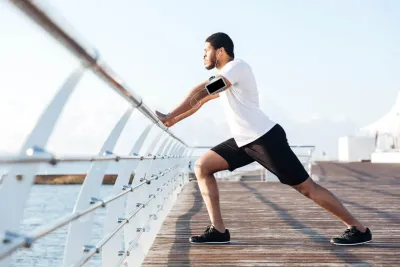Unlocking Peak Performance: The Role of Sleep in CrossFit
Ana Marie Schick: Resident Sleep Expert and Certified Health Coach • Jul 18, 2024

Key Takeaways
Consistent, high-quality sleep plays a major role in CrossFit performance by supporting strength, recovery, and day-to-day training readiness.
- Quality sleep supports better strength output, faster reaction times, and improved endurance during WODs and training sessions.
- Deep sleep is when real recovery happens—muscle tissue repairs, hormones rebalance, and your body resets after hard training.
- Missing sleep adds up. Ongoing sleep debt can increase injury risk, slow progress, and make workouts feel harder than they should.
- Keeping workouts aligned with a consistent sleep schedule helps stabilize energy levels and reduces burnout over time.
- Cooling sleep tools, like a Chilipad cooling mattress topper, help manage body temperature at night, supporting faster recovery and more reliable performance.
CrossFit is known for being tough. It mixes together weightlifting, cardio, and bodyweight movements into workouts called WODs (Workout of the Day) that push you to your limits—physically and mentally. Because of that, recovery isn’t optional—it’s a core part of training.
When most people think about training, they think about lifting heavier or running faster. Sleep probably isn’t the first thing that comes to mind. But here’s the truth: sleep is one of the most important tools you have for recovery.
Without it, your body doesn’t get the chance to repair muscles, build strength, restore energy, or release vital hormones like human growth hormone (HGH).
For CrossFit athletes who are constantly pushing their bodies, the quality of your sleep can make the difference between showing up ready to crush your next WOD—or dragging yourself through it. Prioritizing sleep not only supports peak performance, it also improves overall health and well-being.
That’s why sleep is more than just rest; we'll highlight why it’s your secret weapon for success in CrossFit.
Enhance Your CrossFit Performance with Better Sleep
Achieve restorative sleep and faster recovery with the Chilipad Dock Pro. Regulate your body temperature for deeper, more restorative sleep, which is important for muscle repair and peak performance.
The Impact of Sleep on CrossFit Athletic Performance
Fully understanding the transformative role of sleep in enhancing your CrossFit regimen requires understanding how critical it is in supporting muscle recovery and boosting overall strength.
Recognizing the connection between sleep and athletic performance is essential, as it significantly influences CrossFit training outcomes by impacting physical and cognitive abilities.
"My whole life is tapping into hidden human performance. How can I help the best athletes and teams on the planet lift heavier, run faster, ride farther, and perform better? It starts with sleep. If we are trying to solve chronic pain, change body composition, enhance recovery, or grow stronger and fitter, it has to start with sleep." - Dr. Kelly Starrett, Physical Therapist, 3XNYT Best-Selling author, Speaker and CrossFit Trainer
Muscle Recovery and Growth
Every time you crush a tough CrossFit workout, your muscles take a beating. That soreness you feel? It comes from the tiny tears that happen in your muscle fibers. Don’t worry—that’s actually how you get stronger. But to rebuild and grow, your body needs proper recovery.
One of the most important tools for that recovery is sleep. During deep sleep, your body ramps up production of growth hormone—the stuff that repairs and strengthens your muscles. Think of it as your body’s overnight construction crew, rebuilding the damage so you can come back stronger for your next WOD.
When you skimp on sleep, though, that process slows down. Recovery takes longer, your risk of overuse injuries goes up, and your performance can hit a plateau. On top of that, lack of quality sleep can affect more than just your workouts, increasing risks for things like high blood pressure, poor focus, and even diabetes.
Bottom line: if you want your muscles (and your performance) to grow, don’t just train hard—sleep better.
Strength and Endurance
Sleep isn’t just about feeling rested—it plays a huge role in how strong and resilient you are during training. While you’re asleep, your body is busy repairing muscles, restoring energy, and keeping systems like your heart and cardiovascular health in balance. All of these directly impact your strength and endurance.
When you’re well-rested, you can push through tough workouts, recover faster between sets, and maintain stamina during long WODs. But when you cut corners on sleep, your endurance tanks, your strength takes a hit, and fatigue sets in faster. Even mild sleep deprivation has been shown to reduce performance, making it harder to power through those demanding CrossFit sessions.
The simplest way to look at it is this: sleep is part of your training program. You wouldn’t knowingly skip a key workout—so don’t skimp on sleep, either. Prioritizing it can give you the edge you need to lift heavier, last longer, and perform at your absolute best.
Enhancing Focus and Concentration
A strong focus is important for any training, especially CrossFit training, to improve technique, reduce the risk of injury, and achieve desired fitness goals. Getting enough quality sleep can improve cognitive functions.
CrossFit includes a range of complex and intense movements, so paying close attention to form is crucial to avoid injuries. Concentrating on performing each movement correctly maximizes your effort, making your sessions more effective.
Muscle Growth
During sleep, your body goes through a restorative process that increases the production of human growth hormone (HGH), which plays a vital role in muscle growth and repair.
This hormone promotes protein synthesis, which is necessary for repairing and rebuilding muscle tissue after an intense workout.
It also helps to strengthen bones and connective tissues and boost metabolism. Therefore, if you happen to have a bad night’s sleep, your progress toward achieving your fitness goals can decline significantly.

Improved Mood
Sleep significantly impacts mood, which in turn can greatly affect CrossFit performance. Lack of sleep can lead to irritability, decreased motivation, and a generally negative mood. [1] These emotional states can make workouts feel more challenging and less enjoyable, which may reduce the effectiveness of the training session.
When you're well-rested, your mood typically improves, enhancing your mental resilience and motivation during intense workouts like CrossFit. A positive mood increases mental toughness, allowing you to push through challenging exercises and handle the high-intensity demands of CrossFit more effectively.
Plus, good sleep helps regulate emotions and reduce stress, contributing to better focus and concentration. This mental clarity is crucial for maintaining proper form and technique and strategizing and adapting during workouts.
Sleep and Mental Acuity in CrossFit
Sleep is essential for mental acuity, especially for athletes participating in physically demanding activities such as CrossFit. Regarding cognitive functions such as focus and decision-making, a good night's sleep can be as vital as physical training.
How Much Sleep: CrossFit athletes should aim to get 7 to 9 hours of sleep per night.
Focus and Decision-Making
During CrossFit workouts, concentrating and making quick, accurate decisions are critical. These aren't your ordinary fitness workouts; they are fast-paced and demanding, requiring you to think on your feet.
Exercise routines may include various movements such as box jumps, burpees, snatches, kettlebell swings, muscle-ups, and thrusters.
Adequate sleep is not an option when performing some of the more advanced exercises; it's a must. It enhances cognitive functions, helping you stay sharp and responsive. Sleep allows your mind to process instructions effectively, strategize on the fly, and maintain the level of attention needed for complex movements.
Impact of Sleep Deprivation on CrossFit Performance
Lack of sleep can be a game-changer—and not in a good way. Think of it like training with a mental fog: your focus slips, your reaction time slows, and even simple movements feel harder than they should.
In CrossFit, where workouts are fast-paced and high-intensity, that fog isn’t just frustrating—it’s risky. Poor sleep affects muscle recovery, slows down glycogen replenishment (your body’s energy fuel), and reduces explosive power. That combination makes it easier to get injured and harder to perform at your best.
When you’re fatigued, your coordination and timing take a hit, and your judgment isn’t as sharp. That means more mistakes in training, slower reaction times, and weaker performance in WODs or competitions.
Even outside the gym, your recovery suffers. Without enough sleep, your body struggles to repair muscle tissue and restore energy reserves, which can quickly lead to overtraining and burnout.
The takeaway? If you want to stay strong, sharp, and injury-free, protecting your sleep is just as important as protecting your form. And if you’re dealing with sleep issues like insomnia, sleep apnea, or restless legs, it’s worth getting help. Fixing those problems can boost your recovery, improve performance, and keep you in top shape for the long haul.

Sleep Habits and Hygiene Practices
For CrossFit athletes, training hard is only half the battle—recovery is where the real growth happens. And one of the most important parts of recovery is getting truly restorative sleep. That’s the deep, high-quality sleep where your body repairs sore muscles, resets your energy, and even sharpens your mind for the next workout.
The good news? You can set yourself up for better sleep with a few simple habits. These healthy sleep hygiene practices can make a big difference in how well you recover and perform.
Note: Want practical hacks to finally sleep smarter? Check out Tips for Better Sleep for strategies you can actually stick to.
Sleep Consistency
One of the simplest but most powerful sleep habits for athletes is keeping a steady routine. That means going to bed and waking up at the same time every day—even on weekends. Doing this trains your body’s internal clock (your circadian rhythm), making it easier to fall asleep, stay asleep, and wake up feeling refreshed.
If you’re an early-morning CrossFitter, this might mean lights out by 10 PM and up around 6 AM. Sticking with that schedule not only makes mornings smoother but also supports better recovery and stronger performance over time
Create a Sleep-Friendly Space
Your bedroom can make or break the quality of your sleep, yet it’s something many people don’t think about. Take a look around your room—does it feel like a place that helps you relax, or could it be part of what’s keeping you up at night?
For the best sleep, aim for a bedroom that’s cool, dark, and quiet. Blackout curtains can help block light, while earplugs or a white noise machine can drown out distractions. And don’t forget comfort—your mattress, pillows, and bedding should feel cozy and supportive so your body can fully rest.
Looking to make your bed cooler? Add either our Chilipad Dock Pro, the heating and cooling mattress pad, or Cube, the original temperature controlled mattress pad; they can help maintain an optimal body temperature throughout the night, further aiding in deep, restorative sleep.
If you're not sure which option is best for you, take a look at our comparison page as it breaks down the differences between each bed cooling system to help you understand which choice will best suit your needs.
Did You Know: The perfect temperature for sleep is between 60 and 67 degrees Fahrenheit. If you're interested in learning why that's the best temperature and other reasons for sleeping cooler, take a look at our blog, Discovering the Advantages of
Develop a Relaxing Pre-Sleep Routine
Many athletes, regardless of their training experience, may not fully grasp the benefits of a relaxing pre-sleep routine. However, once they realize that such a routine can significantly boost their recovery and performance, they will be motivated to develop one.
Doing something relaxing before bed—like reading, meditating, listening to music), or practicing gentle yoga, can help signal to your body that it’s time to slow down.
This is especially helpful after tough workouts like CrossFit, which can spike stress hormones such as cortisol and leave you feeling wired instead of ready for rest.
Building a consistent bedtime routine not only helps you unwind, but it also trains your body’s internal clock. Over time, this leads to deeper, more restorative sleep—the kind that supports muscle recovery, sharp thinking, steady energy, and peak performance.
Napping and Its Benefits
Unpredictable schedules can throw off even the most disciplined athletes, especially when training or competitions disrupt normal sleep routines. That’s where strategic napping comes in. They can help you make up for lost rest and keep your performance sharp.
Short naps, about 20 to 30 minutes, are the sweet spot. These quick rests boost alertness, mood, and focus without dragging you into deep sleep stages that leave you groggy. That’s why they’re often called power naps—they give you a recharge without messing up your regular sleep cycle.
Research shows that planned napping can improve cognitive function and lower fatigue, which is especially helpful after tough workouts. But timing matters. [2] Long naps or naps taken too late in the day can lead to sleep inertia—that groggy, foggy feeling—or interfere with falling asleep at night.
Aim for an early afternoon nap, when your body naturally dips in energy. Done right, these short breaks can be a simple but powerful way to stay energized, recover faster, and maintain peak performance.
Monitoring Your Sleep: Why It Matters
For athletes who push their bodies hard, like those training in CrossFit, recovery is just as important as the workouts themselves. Sleep plays a huge role in that recovery, yet it’s often overlooked.
Tracking your sleep—things like sleep stages, heart rate variability (HRV), and other key metrics—can give you valuable insight into how well your body is resting and recovering. With that information, you can make smarter training decisions and support peak performance.
Why Use a Sleep Tracker?
Sleep trackers—whether wearable or non-wearable—give you a clear picture of how well you’re actually sleeping. They don’t just measure how long you’re in bed; they also track sleep stages, interruptions, and even environmental factors that can affect rest.
For athletes, this information is especially valuable. By understanding their sleep patterns, they can fine-tune training schedules, adjust diet, and make smarter lifestyle choices that directly impact recovery and performance.
Tracking your sleep can provide insight into the following:
Understanding Sleep Stages
Sleep isn’t just one long stretch of rest—it’s made up of different stages that each play a unique role in recovery. Throughout the night, your body cycles through light sleep, deep sleep, and REM sleep, and each stage supports you in different ways.
Deep sleep is when your body focuses on muscle repair and growth, making it especially important for athletes. REM sleep, on the other hand, is key for processing emotions and strengthening memory.
By tracking how much time you spend in each stage, you can spot imbalances and make adjustments—whether that’s through recovery habits, training tweaks, or lifestyle changes—to get more out of your rest.
HRV: The Heartbeat of Recovery
Heart rate variability (HRV) measures the tiny differences in time between each of your heartbeats. It might sound technical, but it’s actually one of the best indicators of how your body is handling stress and recovery.
For athletes, a higher HRV usually means your body is well-rested, resilient, and ready to perform. By tracking HRV, CrossFit athletes can get a clear picture of how well they’ve recovered from training and whether it’s smart to push hard again—or take a rest day to avoid overtraining.
Are you looking to improve your HRV? We've included 12 strategies on how to increase your HRV.
Final Thought
If you're into CrossFit, you know how much it can push your physical and mental limits. That's why getting quality sleep is more than just a luxury - it's like another workout!
While most athletes focus on their food and training, sleep is like a secret weapon that can help you take your performance to the next level. So, if you want to outperform your goals and feel your best, remember to prioritize getting some quality shut-eye!
Good sleep is crucial for muscle repair, stress hormone management, mental acuity, and injury prevention during high-intensity exercise. Remember, excellent performance starts with a good night's sleep. Embrace the power of sleep to transform your fitness journey.
HRV Frequently Asked Questions
How Does Sleep Influence Muscle Recovery in CrossFit?
Sleep is crucial for repairing the micro-tears in muscles that occur during intense CrossFit workouts. When we enter deep sleep, our bodies release growth hormone, which is vital for muscle repair and growth. Not getting enough sleep can slow down this process, resulting in longer recovery times and a higher risk of injury.
How Many Hours Should CrossFit Athletes Sleep?
Aim to block off at least 9 to 10 hours of time for sleep each night. You may not snooze for the full stretch, but setting that window gives your body a better shot at hitting the sweet spot. Think of it like a training goal—shoot for ten, land at eight or nine, and you're still in solid recovery territory. For athletes, eight hours is the bare minimum; more is better.
What Are Effective Sleep Hygiene Practices for CrossFit Athletes?
To optimize sleep quality and, consequently, CrossFit performance, consider the following practices:
- Maintain a Consistent Sleep Schedule: Go to bed and wake up at the same times daily to regulate your body's internal clock.
- Create a Restful Environment: Ensure your bedroom is cool, dark, and quiet to promote uninterrupted sleep.
- Limit Exposure to Screens Before Bedtime: Reduce blue light exposure from phones, tablets, and computers at least an hour before sleeping.
- Avoid Caffeine and Heavy Meals in the Evening: These can disrupt sleep patterns and hinder the body's ability to rest.
- Incorporate Relaxation Techniques: Practices such as deep breathing, meditation, or gentle stretching can help calm the mind and prepare the body for sleep.
Peer-Reviewed Research References
-
Triantafillou, S., Saeb, S., Lattie, E. G., Mohr, D. C., & Kording, K. P.
Relationship Between Sleep Quality and Mood: Ecological Momentary Assessment Study.
JMIR Mental Health, 2019.
Study Type: Ecological Momentary Assessment (EMA) Study
Key Finding: Poor sleep quality was closely associated with worse next-day mood, while better sleep predicted improved emotional well-being, highlighting the bidirectional relationship between sleep and mental health.
View Study
Source URL: https://mental.jmir.org/2019/3/e12613/
-
Milewski, M. D., Skaggs, D. L., Bishop, G. A., Pace, J. L., Ibrahim, D. A., Wren, T. A., & Barzdukas, A.
Chronic Lack of Sleep Is Associated with Increased Sports Injuries in Adolescent Athletes.
Journal of Pediatric Orthopaedics, 2014.
Study Type: Observational Cohort Study
Key Finding: Adolescent athletes who slept fewer than eight hours per night had a significantly higher risk of sports-related injuries, underscoring sleep’s critical role in physical recovery and injury prevention.
View Study
Source URL: https://pubmed.ncbi.nlm.nih.gov/25028798/









